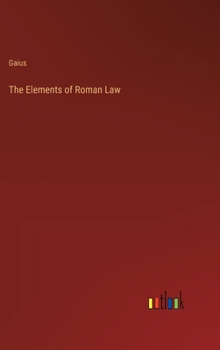The Elements of Roman Law
Select Format
Select Condition 
Book Overview
Reprint of the original, first published in 1875.
Format:Hardcover
Language:English
ISBN:3385246415
ISBN13:9783385246416
Release Date:January 2024
Publisher:Outlook Verlag
Length:734 Pages
Weight:2.73 lbs.
Dimensions:1.8" x 6.0" x 9.0"
Customer Reviews
1 rating
The One and Only Law Book from the Early Empire
Published by Thriftbooks.com User , 19 years ago
Not being a lawyer, but merely a sometime student of early Roman law, I may not be the most qualified critic to review this book. But it is a remarkable enough book that I couldn't let it go without a positive comment. Composed sometime in the Mid 2nd Century AD, the Institutes is one of the most important books in Roman literature. Its unpopularity and scarcity today is no indication of its worth to the specialist and general reader alike. I won't go so far as to say it is a "delight" to read; It is still, as it was first intended to be, an introductory textbook for students of Roman Law...well, perhaps no longer such a good FIRST introduction (go to Alan Watson's "Roman Law and Comparative Law" or his "Spirit of Roman Law" for that). So what is its worth? Historically, it is the most complete of all the juristic texts written before the Theodosian Code and Justinian's Corpus. Of all the jurists represented by short citations in Justinian's Digest, only Gaius can be filled out with longer manuscripts. The result is a rich and lengthy text, which in this edition fills a sizable but portable volume (this cannot be said for Justinian's Digest). The content, caveat emptor, will seem dry to many people who approach it wihtout a good reason. As with an oracle, one should have their questions ready before they approach. A very thorough "Outline of Contents" in place of an index helps quickly orient the reader towards the answers they seek. A student of Roman law, as well as the student of American Law for that matter, will find the seeds of his or her study already firmly rooted and blooming here. The more general reader will discover an abundance of cultural facts and dilectable quanta of information. Since a culture is perhaps better reflected in its laws than in any other single institution, the careful reader can derive from the Institutes much about Romans that is hidden in Roman literature and art. For instance, slaves, who are often silent and ignored elsewehere are here represented by dozens of legal precedents. The rights and lifestyles of children, generally found only in untrustworthy (aggrandizing) biography, myth, or comedic anecdotes are here presented in the full scope of their legality and self-possesion (or lack thereof). In short, these laws can bespeak both shared community interests, and the opposite, the unlawful but potent desires that motivate individuals to act outside the common interest. Being a careful and thorough jurist, however, Gaius gives more detail than a non-specialist reader (like myself!) sometimes wants. But I'm willing to overlook the superfluities in trade for such wonderful gems of information I get; such as the fact that senators would often free slaves so frivolously that it was common to witness several manumissions in the course a short walk to a friend's dinner party; and such as the clever trick for avoiding the consequence of legal lists by writing the names of the list in a circ





